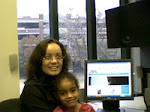As you know, this is my last week working with all of you as your literacy coach. It has been a pleasure learning about your teaching experiences and learners at the various sites and sharing literacy resources with all of you. Although you will be continuing your year of service for a few more months, I thought it would be appropriate to leave you with a short reflection template that may be useful. This short document was created by the Center for Teaching Effectiveness (CTE) at the University of Texas at Austin. A Template for Self-Reflection on Teaching will be a helpful tool as you think about your instructional strategies and your learners' responses to your lessons/activities.
- A Template for Self-reflection on Teaching
Ask yourself the following questions immediately after teaching a class session that you’re interested in. The process should help you get some ideas about things you do well and things you could do better.
1. What were my goals for this teaching session?
2. How was I trying to achieve them? What instructional strategies did I use?
3. How did I try to assess student understanding of this content? How satisfied am I with their progress?
4. What did I see my students doing during class? Were they attentive, interacting, taking notes, etc.?
5. What do other important actors in the class (e.g. other instructors, the teaching assistants) observe about this class session?
6. What key areas should I target for improvement?
7. What can I do to improve the teaching of this content/class?
Best wishes to all of you as you complete your last few months of service!
Hazel


